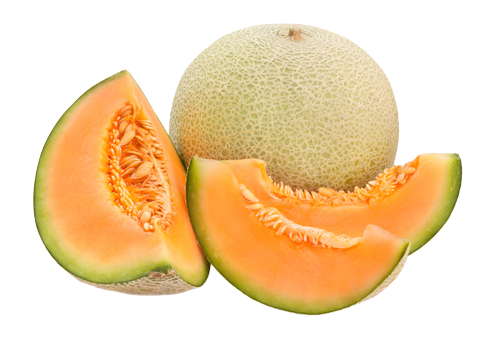Egyptian Galia Melon – Cantaloupe
Egyptian Galia Melon – Cantaloupe – is generally eaten as fresh fruit, as a salad, or custard, or as a dessert with ice cream.

- Product: Fresh Egyptian Watermelon
- Available varieties: Escatta
- HS Code: 080710
- Sizes & Package: 4 Pieces. 20 Kg Standard carton.
- Middle of May till End of August
- Shipping: Sea Shipment & Air Shipment
Health benefits of eating cantaloupe
- Hydration: Cantaloupe's abundant water content helps maintain the body's hydration and supports optimal bodily functions.
- Nutrient-rich: Cantaloupe is a valuable source of vitamins A and C, as well as essential minerals like potassium and magnesium, which contribute to overall health.
- Eye health: Cantaloupe contains beta-carotene, a precursor to vitamin A, which supports good vision and promotes eye health.
- Immune system support: The high vitamin C content in cantaloupe strengthens the immune system and aids in protecting against infections.
- Digestive health: Cantaloupe's dietary fiber aids digestion, prevents constipation, and promotes a healthy digestive system.
- Heart health: Cantaloupe's low sodium and high potassium content help maintain healthy blood pressure levels and support cardiovascular health.
- Skin health: Cantaloupe's antioxidants protect the skin from damage caused by free radicals and contribute to a healthy complexion.
- Weight management: Cantaloupe is low in calories and provides a sense of fullness due to its high water and fiber content, making it suitable for weight management.
- Anti-inflammatory properties: Cantaloupe contains compounds with anti-inflammatory effects that may reduce inflammation and alleviate symptoms of certain inflammatory conditions.
- Hydration during exercise: Cantaloupe's high water content and electrolyte balance make it beneficial for maintaining hydration during physical activity.
Moderate consumption of Cantaloupe as part of a balanced diet will lead above mentioned health benefits.
Types of melons are cultivated in Egypt
Egypt is a large producer of melons, and numerous varieties of melons are grown in the nation. The following are some of the most prevalent varieties of Egyptian melons:
- Galia: A famous melon type in Egypt recognized for its sweet flavor, juicy texture, and powerful perfume. It has a greenish-yellow skin and flesh that is green or orange.
- Cantaloupe: A popular melon type produced in many places throughout the world, including Egypt. It boasts a luscious, orange flesh and a sweet, musky flavor.
- Honeydew: A melon cultivar recognized for its sweet, mild flavor and soft texture. It has a smooth, light green skin and flesh that is pale green or white.
- Watermelon: This is a popular melon type that is grown in many countries, including Egypt. It has a firm, green rind and delicious, juicy flesh.
Characteristics of Egyptian Galia melon
Appearance: The medium-sized Galia melon is round to slightly oval in form. Its skin has a netted pattern of light brown lines with a greenish-yellow base color.
Flesh: Egyptian Galia melon flesh is delicious and juicy, and it is a light shade of green. The texture is smooth, and the scent is very fruity.
Flavor: Egyptian Galia melons have a taste that is sweet, musky, and somewhat tangy. It is regarded as one of the flavorsome and sweetest melons.
Nutrition: Egyptian Galia melon is a low-calorie fruit that is rich in vitamins and minerals. It is a good source of vitamin C, vitamin A, and potassium.
Ripeness: When ripe, the Egyptian Galia melon should have a strong, fruity aroma and feel slightly soft to the touch. It should also have a yellowish color around the stem area.
Season: Egyptian Galia melons are typically harvested from May to September.
